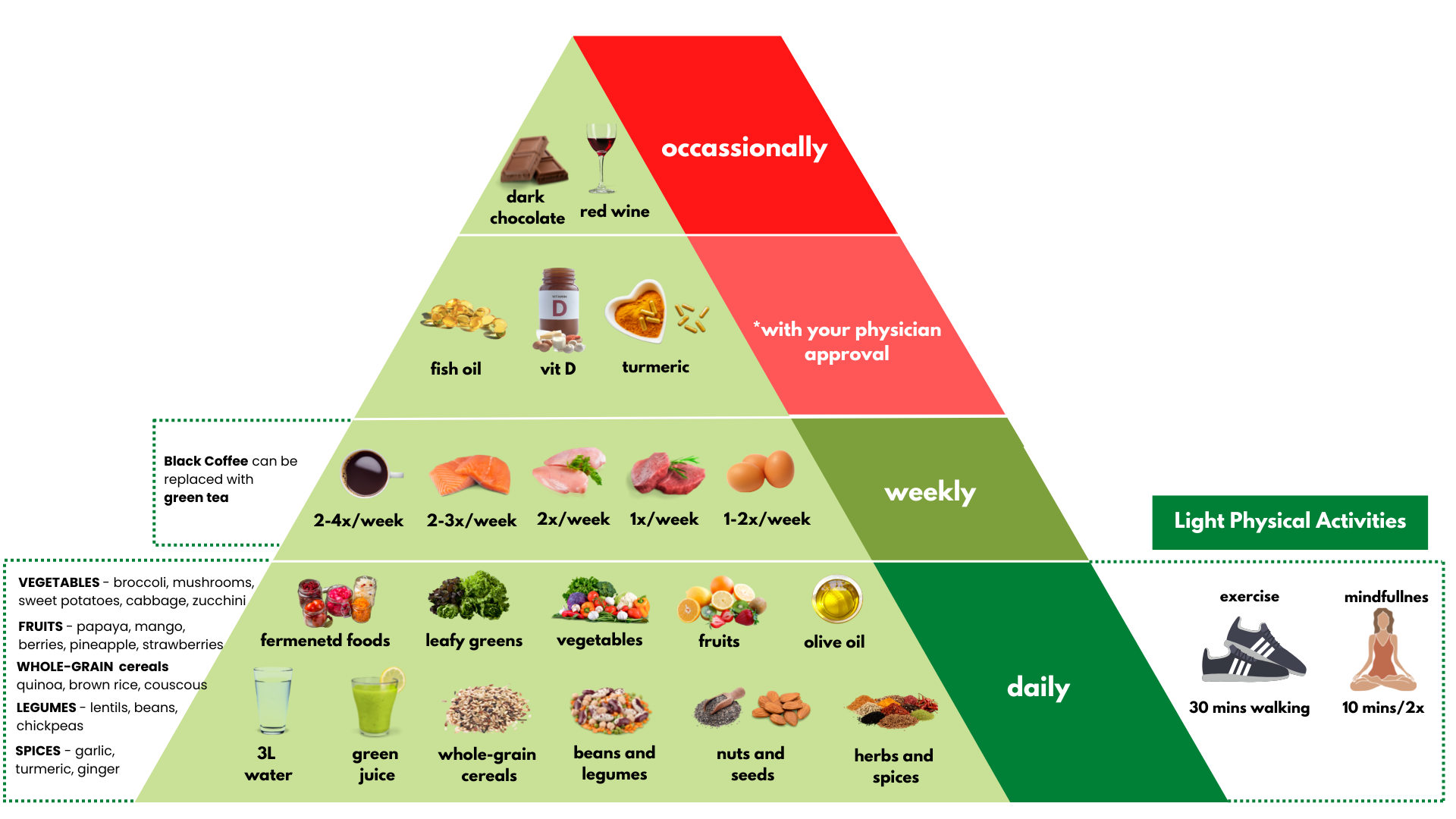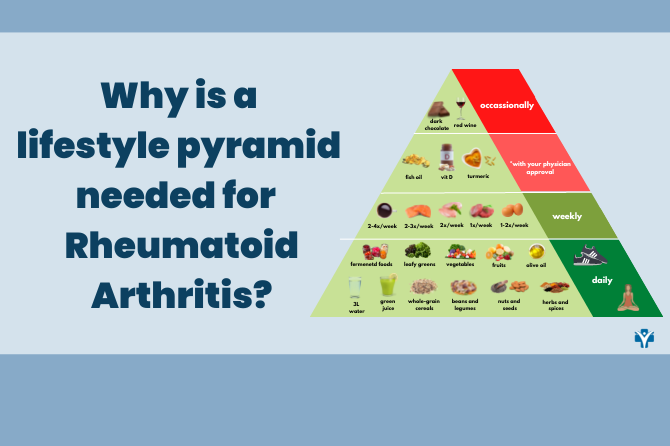SHARE
Rheumatoid arthritis is a common autoimmune disease affecting approximately 1.5 million people only in the United States. Interestingly, many of my patients reported that what they eat affects how they feel.
Is this a simple observation, or is this a reality call?
In this article, I will discuss
- How can food affect your disease?
- What food choices do you need to make to feel better?
- Why should you start exercising, and what types of exercises are beneficial?
- Why use mindfulness to reduce stress and pain?
I will share with you not only a FOOD PYRAMID that my patients use, but it will also incorporate all these lifestyle interventions that will help you reduce the pain, stress, and inflammation and will improve the way that you feel and live with rheumatoid arthritis.
I am happy to share that part of this article was recently approved for publication in one of the largest medical blogs in the United States, Kevinmd.com (I will post the link to the article once is published).
Let’s begin!
How can food affect your disease?
As I mentioned, many of my patients reported that after they eat certain foods the next day, they will feel more pain and stiffness in their joints. Food like sugar, processed food, fried food, too much salt, or even eating foods with gluten may cause more pain and stiffness in your joints.
Is this a simple observation, or is this a reality call?
At first, I thought this was just an incidental report, but then I started hearing it from more and more patients.
It made me curious to find out more. During our medical training, we tend to get supra-specialized. As a rheumatologist, I learned extensively about how to diagnose autoimmune diseases and then how to use targeted therapy to modulate the immune system. However, I learned nothing about nutrition or the gut microbiome’s impact on the immune system.
This led me to my discoveries. After reading hundreds of research studies, I found scientific evidence in a few years. And yes, the patients were right! Their immune system was massively impacted by the food that they eat, the stress that they experienced and their sleep.
In my practice, I approach the patient from multiple angles. I learned that it is important to ask my patients :
“How do you feel?”
“What do you usually eat? “
“What are the major stressors in your life?”
“How much do you exercise?”
“How much sleep do you have?”
Scientific proof
In a study of 300 patients with rheumatoid arthritis surveyed about the consumption of 20 foods, the patient’s symptoms were impacted by the type of food they ate. Nearly a quarter of patients reported that foods such as blueberries, strawberries, fish, and spinach relieved their symptoms, while sugary juices and desserts worsened their symptoms.
Excessive use of salt increases joint pain and blood markers of inflammation.
Excluding red meat, glucose, and lactose for three months can also benefit some patients.
Replacing coffee with green tea was also recently recommended. Eating a diet full of fibers (e.g., leafy greens, lentils, beans, soy, whole grains), increases the amount of short-chain fatty acids produced by our gut microbiota, which is linked to reduced inflammation.
Patients using probiotics for at least 8 weeks experienced less joint pain and swelling.
Adding spices to the food or as a supplement (e.g. turmeric, garlic, ginger) was also shown to reduce the symptoms of rheumatoid arthritis.
Even if my patients do not have a diagnosis of rheumatoid arthritis, I encourage them to adopt an anti-inflammatory/ Mediterranean diet as it will reduce the risk of developing this disease by 21%.
Why should you start exercising, and what types of exercises are beneficial?
When you are in pain, you tend to avoid exercising. Many of my patients ask me if it is beneficial or not to exercise. Many patients fear that exercise will cause more pain to their joints.
If you suffer from rheumatoid arthritis, exercise is a MUST and should be part of your treatment.
Let me explain more: During intense episodes of inflammation, the fluid in your joints gets thicker, making your joints stiffer. When you start moving or exercising, there is more fluid produced by your joints, and that will cause the joints to loosen up and be less stiff. As a good friend of mine says, Dr. Andrea Furlan, “motion is lotion!”
If you do not exercise due to fear of pain, you may become overweight.
Scientific proof
Being overweight or obese was associated with higher chances of developing autoimmune and inflammatory diseases, such as Rheumatoid arthritis.

I encourage all my patients and you to engage in walking, stretching, and swimming exercises.
The goal is to reduce pain, inflammation, and fatigue, and improve joint mobility, strength, and flexibility, but also the mood changes and decrease weight.
Why use mindfulness to reduce stress and pain?
Many of my patients describe that before their symptoms of autoimmune disease surface, they experience significant stress in their life: like a divorce, losing a job, changing a job, or losing someone dear.
The question I had, and most likely you have, is: is there a connection between the immune system and our mind?
And the answer is YES!
Our mind is very well connected to our body and our gut!
That is why you feel that in your gut when you are stressed!
But the gut is where many of your immune system cells reside, and the gut is the home of trillions of bacteria. Many studies show that these bacteria are influenced by the food that we eat and the stress that we experience. In consequence, these bacteria are not “happy” they affect your immune system, creating more inflammation and more pain.
Now, the question is, will you feel less pain if you reduce the stress? The answer is YES.
Scientific proof
A 2020 meta-analysis of randomized control trials in patients with rheumatoid arthritis of 337 patients showed that mindfulness interventions significantly improve pain intensity, depression, and symptoms compared with conventional therapy. Mindfulness will also decrease the daily pain in patients with rheumatoid arthritis. That is why I teach my patients how to approach pain and incorporate simple breathing techniques, guided imagery, or other relaxation techniques. In a matter of weeks, patients will experience less pain, better sleep, and better quality of life.
To be easier for my rheumatoid arthritis patients, I have designed a lifestyle pyramid.

It includes the amounts and types of food needed to prevent or reduce the risk of developing rheumatoid arthritis and reduce the inflammation and pain related to this disease. It was adapted to include scientifically proven foods with anti-inflammatory properties and exclude foods that can potentially cause more inflammation. In addition, recommendations about supplements, exercise, and mindfulness were added. My patients find it very easy to use and beneficial.
Considering all the evidence, healthy lifestyle interventions are essential in patients with Rheumatoid arthritis. Thus, I constantly encourage patients with rheumatoid arthritis to make better lifestyle choices that will positively influence their minds, health, and life. If you want to learn more, I have designed a comprehensive online course that includes the “Rheumatoid Arthritis Healing formula”. This course cuts through all the misinformation that is out there on the internet and gives you a simple yet highly effective formula for lowering inflammation in your body. Check this link out: https://www.myarthritiswellness.com/ .














